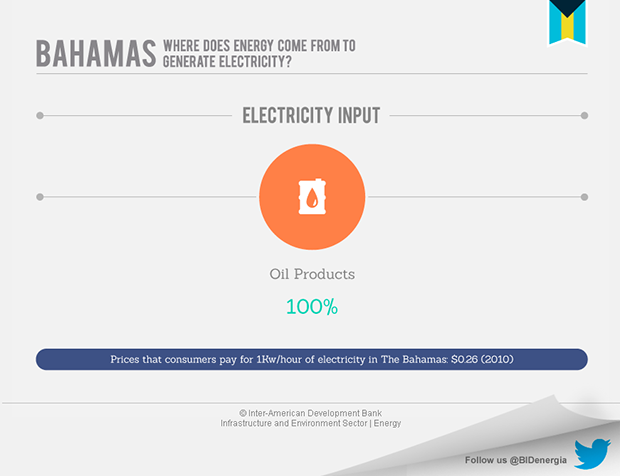Bahamas: Energy Market Overview
The Commonwealth of the Bahamas comprises about 700 islands and cays, 30 of which are inhabited, and is home to a population of 338,000. More than two thirds of the population resides in the capital city of Nassau on the island of New Providence. Like the economies of most Caribbean island states, the Bahamas’ economy is disproportionately service oriented with little capacity for the manufacturing of goods. The tourism industry is the country’s most important sector contributing directly or indirectly to more than 60 percent of the overall GDP and employing half of the total labor force. (Organization of American States, 2010; Wilson, 2009)
The Bahamas import 99 percent of their energy needs, mostly in the form of oil products. Virtually all of the Bahamas’ electricity is supplied by two large utility companies. Bahamas Electricity Company (BEC) produces about 80 percent of electricity with the remaining 20 percent coming from the Grand Bahama Power Company (GBPC). The BEC was established in 1956 through the Electricity Act of the same year and is wholly government owned. The Grand Bahama Power Company was established as Freeport Power Company in 1964 under the Grand Bahama Port Authority. (GBPC, 2010)
Total generating capacity is 137 MW, including a 27 MW diesel plant, two gas-fired plants combining for 35 MW, and a 75 MW steam plant. In 2009 44 percent of electricity was produced using heavy fuel oil with the remaining 56 percent coming from automotive diesel oil. (Government of Bahamas, 2010; Organization of American States, 2010)
Electricity is distributed along 16 isolated island grids. Thus, expansion is incremental and generation capacity is primarily small diesel plants with a capacity of 25 MW and less. Per capita consumption is very high with 5,700 kWh per capita per year. (Organization of American States, 2010; Wilson, 2009)
Bahamas: Energy and Electricity Sector Regulatory Framework

The Ministry of the Environment (MOTE) is the responsible agency for the energy sector in the Bahamas. It is supported by the Bahamas Environment, Science & Technology Commission (BEST) which assesses the environmental impact of energy and electricity sector projects. At a future date, yet to be determined by the government, the newly created Utilities Regulation and Competition Authority (URCA), which currently regulates electronic communications, will be task to “assume responsibility” for the electricity sector. (Government of Bahamas, 2010; Organization of American States, 2010)
The primary regulatory acts that govern the electricity sector are the Electricity Act, the Out Island Electricity Act and the Out Island Utilities Act. The BEC was established through the Electricity Act and tasked with the secure supply of electricity at a reasonable price and mandated to “purchase, generate, transmit, transform, distribute and sell energy to in bulk or to individual consumers.” (Government of Bahamas, 2010; Organization of American States, 2010)
The Out Island Act allows for the creation and operations of private utilities to supply electricity to the Family Islands if “it is in the nation’s best interest.” It has been difficult for the private sector to meet this provision and as a result BEC continues to be the exclusive electricity provider except on Grand Bahama and a number of very small franchise holders which are allowed operation in the area controlled by the Grand Bahama Port Authority under the Hawksbill Creek Act. (Government of Bahamas, 2010; Organization of American States, 2010)
The monopoly supplier (BEC) is not required to purchase electricity generated by independent power producers (IPP) offering limited incentive for outside investments into the electricity sector as a whole or RE sources in particular. No regulation exists for the interconnection of power generation making it nearly impossible for IPP to feed their capacity into the existing grid. Furthermore, there does not exist a national energy efficiency standard or a national energy conservation effort and by some estimates as much as 27 percent of electricity demand could be saved through efficiency measures. The Government of the Bahamas functions at the same time as the “policy-maker, regulator, and owner” leading to a less than ideal set-up for the electricity sector. The current regulatory framework has resulted in a “regional monopoly on electricity production and distribution” which lacks competition and efficiency and fails to produce electricity at “reasonable” prices. (Government of Bahamas, 2010; Organization of American States, 2010; Renewable Energy & Energy Efficiency Partnership, 2012)
Government of Bahamas. (2010). Second report of the national energy policy committee.
GBPC. (2010). History of the GBPC. Retrieved from http://www.gb-power.com/en/home/aboutgbpc/history.aspx
Organization of American States. (2010). Energy Policy and Sector Analysis in the Caribbean 2010-2011.
Renewable Energy & Energy Efficiency Partnership. (2012). Bahamas ( 2012 ). Retrieved from http://www.reegle.info/policy-and-regulatory-overviews/BS
Wilson, C. (2009). Renewable Energy Policies in the Caribbean.


Leave a Reply